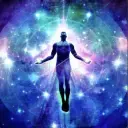I see the human organism as a layering of different levels of consciousness. Each layer supports mostly automated processes that sustain the layers beneath it.
For example, we have cells that only know what it’s like to be a cell and to perform their cellular processes without any awareness of the more complex layers above them. Organs are much more complex than cells and they perform their duties without any awareness of anything above them either. And the complexity keeps increasing with various systems like endocrine, cardiovascular, etc. Then we have our subconscious and finally our conscious.
At our level, we do not consciously control any of the layers beneath us. Our primary task is to keep our bodies alive.
This got me thinking… isn’t it a little too self aggrandizing to think that we have a near infinite layering of consciousness beneath us and then it just stops at our level of awareness? What if there is some other conscious process that exists above us within our own bodies?
When people take psychedelic drugs they often describe achieving a higher level of awareness akin to ecstasy. Well what if this layer is always there actively ”living” within us but we are just the chumps that go to work, do our taxes, and exercise, while it doles out just enough feel good chemicals to keep us going (sometimes not even that)?


The big issue of the scientific method is that it throws away all truths that cannot be falsifiable, riggerously tested or measured. Or to put it simply, not everything that is true has a gaurentee to be proveable. There are some truths which no system of logic or experimentation can definitively determine the validity of. Mathematicians already had to deal with this existencial crisis of limits to provability with Gödel’s incompleteness theorem. If absolute knowability is already screwed in the purely theoretical world of abstract logic, there is most likely an equivalence in the physical sciences. They are two sides of the same coin after all. There is most likely no theory of everything, not even of just physical reality, and never will be.
There are parts of human experience and more generally reality itself that science will forever denounce because they are non-physical and non-falsifiable. Unfalsifiability doesn’t make the experiences any less real or true in the eyes of reality, just unprovable by the standards of the scientific model.
I was always a big fan of science, even as a kid. The universe facinated me and I always wondered why things work the way they do. Now I see its limits as well as the inherent flaws and biases that exist within the scientific community.
I’m not sure why you’re getting downvoted. I think that the scientific method is invaluable. I also think that it will never be complete because it is mostly quantitative while consciousness is qualitative (qualia are defined as instances of subjective, conscious experience).
For as long as science keeps subjective experience out of the equation (which by definition it kinda has to) then I also don’t think there will ever be a theory of everything.